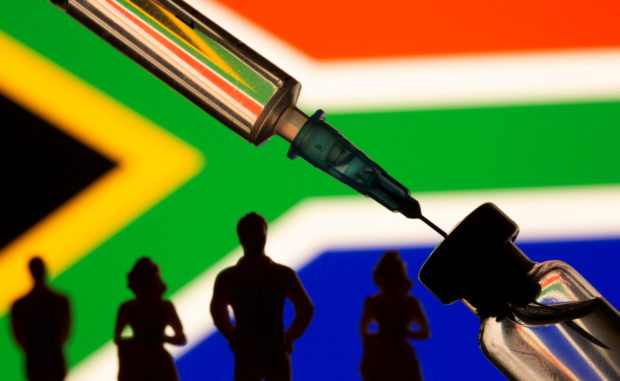J&J booster slashes Omicron hospitalizations–S.African study

A vial, syringe, and small toy figures are seen in front of displayed South Africa flag in this illustration taken, February 9, 2021. REUTERS FILE PHOTO
CAPE TOWN — A booster dose of Johnson & Johnson Inc’s single-dose COVID-19 vaccine was 84% effective at preventing hospitalization in South African healthcare workers who became infected as the Omicron variant spread, researchers said on Thursday.
The real-world study, which has not been peer-reviewed, was based on a second dose of the J&J vaccine administered to 69,092 workers between Nov. 15 and Dec. 20.
An initial course of inoculation has been shown to offer only greatly reduced protection against infection by Omicron, which is spreading quickly through many countries after first being identified in late November in southern Africa and Hong Kong.
However, several studies have suggested that a booster dose provides significant protection against severe illness from the variant.
The South African study showed the J&J vaccine’s effectiveness at preventing hospitalization rose from 63% shortly after a booster was administered to 84% 14 days later. Effectiveness reached 85% at one to two months post-boost.
Article continues after this advertisement“It reassures us that COVID-19 vaccines continue to be effective for the purpose they were designed, which is to protect people against severe disease and death,” said Linda-Gail Bekker, the study’s co-lead investigator.
Article continues after this advertisement“This is yet another piece of evidence that we have not lost that impact even in the face of a very mutated variant.”
Bekker said the jury was “still out” on the issue of further boosters of the J&J shot.
“What we are showing is that two doses really restore full protection, and I don’t think we can extrapolate from this that we are going to need a third or a fourth boost at all.”
Researchers said their analysis had several limitations, including short follow-up times, which averaged eight days for healthcare workers who had received their boost within the previous 13 days, or 32 days for those boosted for 1-2 months earlier, and which could skew overall vaccine effectiveness.
Another South African-based study this month showed that a first round of inoculation with two doses of Pfizer-BioNTech’s COVID-19 vaccine had been less effective in South Africa at keeping people infected with the virus out of hospital since the Omicron variant emerged.
For more news about the novel coronavirus click here.
What you need to know about Coronavirus.
For more information on COVID-19, call the DOH Hotline: (02) 86517800 local 1149/1150.
The Inquirer Foundation supports our healthcare frontliners and is still accepting cash donations to be deposited at Banco de Oro (BDO) current account #007960018860 or donate through PayMaya using this link.